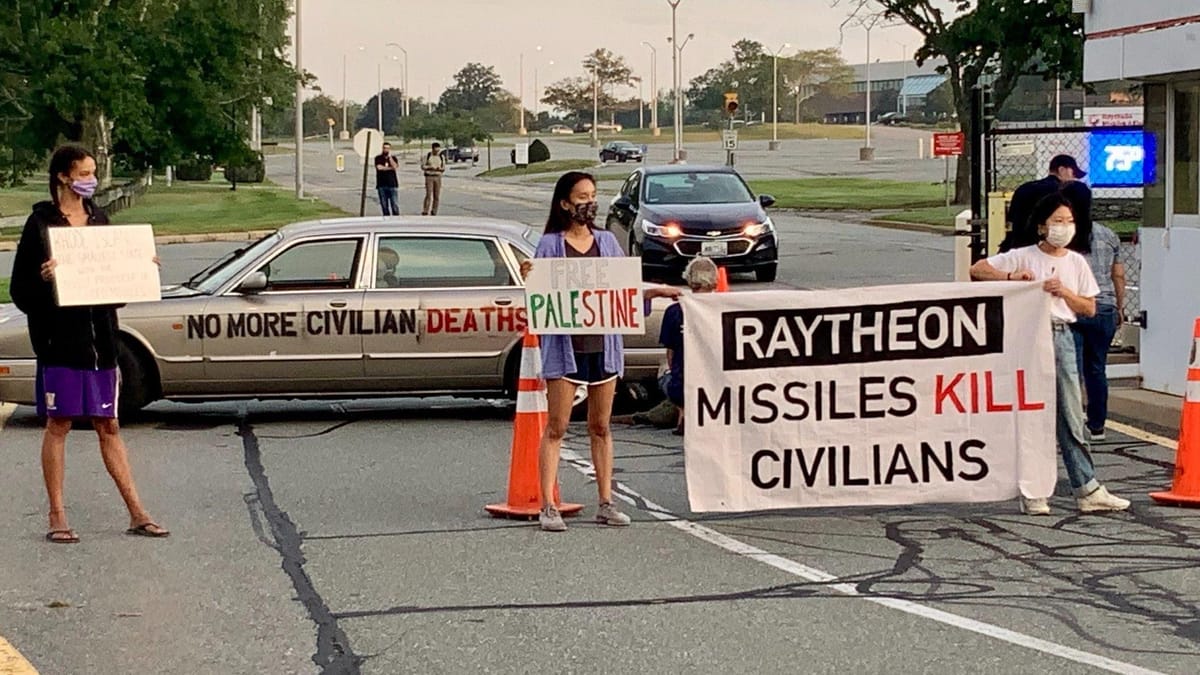Palestine Solidarity Activists Are Mapping the War Machine

As protests against Israel’s genocidal attacks on Gaza have unfolded in recent months, some groups have taken action against arms manufacturers whose weapons and munitions are being used against Palestinians. In the UK, Palestine Action has been relentless in its use of blockades to shut down facilities run by Elbit Systems, Israel’s largest private arms supplier. On Monday, the organization launched its first campaign in Belgium with actions targeting Elbit and Thales, another company the group says is manufacturing weapons for Israel. In the United States, groups like Dissenters, Palestine Action US, and Resist and Abolish the Military Industrial Complex (RAM INC) have staged blockades and other disruptions targeting companies like Raytheon, Boeing, Woodward and Elbit in an effort to undermine Israel’s war-making. Recently, RAM INC has created a new resource map of facilities that RAM INC members say are actively producing weapons for Israel. The map was released on social media alongside a call to action imploring people of conscience to “SHUT DOWN these facilities that are arming Israel’s genocide in Gaza.”
I spoke with Nadia*, a member of RAM INC who helped create the map, about the research that went into the project and why their collective felt it was necessary to create this resource. “Much of the U.S. military aid to Israel is intentionally shrouded in secrecy,” Nadia said. They explained that while some US military aid to Israel comes in the form of direct shipments of weapons from U.S. stockpiles, some military aid is extended through grants, which Israel uses to purchase weapons from U.S. corporations. “Of course, there are many ways to identify the weapons and military equipment used by Israel and who makes them,” they said. “There are fragments of bombs that have been recovered with identifying information, lists of weapons given to Israel that then can be traced back to their producer, and press releases and public boasting by military contractors about the arms they sell to Israel – although this seems to be getting rarer.”
Activists around the world have utilized this knowledge to stage protests targeting military contractors who are arming Israel. “But as these protests escalate,” Nadia said, “there has been an effort within the movement to sharpen our focus and create the greatest disruption to the genocidal Israeli military as possible. With this intent, our collective worked to identify facilities that were confirmed to actively be producing weapons for Israel at this very moment.”
Researching the distribution of weapons can be daunting, dispiriting work. “The Department of Defense contract database is horrifying,” Nadia said. “Every day, hundreds of millions of dollars of military contracts are awarded.” The database, which includes some contracts granted to foreign governments, is keyword searchable. “So, we first identified all active, public military contracts with Israel,” they explained. “We found 41 contracts in total, worth over $11 billion. The most recent of which was awarded on February 15th.” The majority of those contracts were for “fighter jets, attack helicopters, bombs, and military vehicles.” The contracts also indicate where the work is being performed. “We cross-referenced this information with subcontractor databases, which have even more detailed information about where the work is being performed and exactly by whom.”
The group’s research revealed the expansive, tangled web of the arms production process. “While some contracts were direct, with work being performed at one facility, many of the contracts involved hundreds or even thousands of subcontracts,” Nadia said. They pointed out that a wide distribution of labor meant that “many manufacturer employees might not even know that the small components and moldings that they are making are being used to further Israel’s genocide in Gaza.” Their research also emphasized the importance of subcontractors to major arms manufacturers. “We realized that while the largest military contractors on the planet have extensive production facilities, they heavily rely on vast networks of subcontractors to accomplish their work. Ultimately, we did not map every single subcontractor due to limited capacity, but we did list major ones.”
Nadia hopes the map will help activists take direct action in defense of the Palestinian people. “We hope that this consolidated public information can be used by activists and people of good conscience to take strategic action towards the freedom of Palestine, an end to the genocide, and the abolition of the U.S. military-industrial complex.”
Actions that target weapons companies are not without risk. Three activists with Palestine Action US are currently facing felony charges over a protest at Elbit Systems of America in Merrimack, New Hampshire, last November. During the protest, activists climbed on the company’s roof and allegedly defaced the building with paint.
Nadia acknowledges that actions targeting weapons manufacturers can sometimes lead to serious charges but says that the severity of Israel’s violence has moved members of RAM INC to assume those risks. “Every day, the facilities listed on this map are making weapons that are being used to kill Palestinians and continue Israel's colonial occupation of Palestine,” they said. “Of course, there is risk in taking action to disrupt the flow of weapons to Israel, but these consequences are nothing compared to the risks that Palestinians are facing just to live another hour.”
For Palestinians in Gaza, the stakes could not be higher. At least 31,140 Palestinians have been killed by the Israeli military since October 7. At least 12,300 of those killed have been children. Approximately 8,000 Palestinians are currently missing. Nadia argues that those numbers demand dramatic action. “If we want to have an impact, if we want to free Gaza and end the genocide, then we must act.”
*This interviewee is using an assumed name due to concerns about doxxing and other threats.




